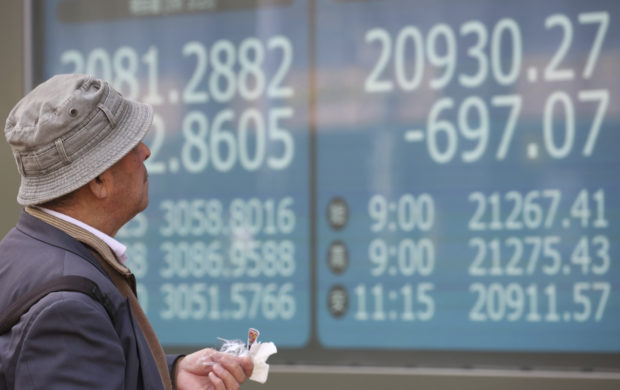
A man looks at an electronic stock board of a securities firm in Tokyo, Monday, March 25, 2019. Shares were sharply lower in Asia on Monday after Wall Street ended last week with a broad retreat.(AP Photo/Koji Sasahara)
BANGKOK – Shares tumbled in Europe and Asia on Monday after Wall Street ended last week with a broad retreat. Thailand’s benchmark dipped following a general election that appeared likely to keep the incumbent, junta-backed prime minister in power.
Wall Street was roiled Friday by fresh signs that global economic growth is slowing. The jitters spurred a sell-off in stocks and sent bond yields sharply lower, flashing warning lights for a possible recession.
Among the triggers was news that factory production in the euro currency alliance fell at its steepest rate in about six years, according to surveys of manufacturers’ purchasing managers.
In early trading Monday, Germany’s DAX dropped 0.3 percent to 11,326.00 and the FTSE 100 in Britain lost 0.4 percent to 7,178.04.
The CAC 40 in France declined 0.6 percent to 5,237.30. Wall Street looked poised to extend losses, with the future contract for the Dow Jones Industrial Average down 0.4 percent to 25,471.00.
The Standard & Poor’s 500 future contract also lost 0.4 percent, to 2,798.70.
The declines started in Asia, where Japan’s Nikkei 225 stock index skidded 3.0 percent to 20,977.11, while the Shanghai Composite index dropped 2.0 percent to 3,043.03.
The Hang Seng in Hong Kong lost 2.0 percent to 28,523.35.
Thailand’s SET dropped 0.9 percent after a military-backed party prevailed in the country’s first election since a 2014 coup, after tilting the electoral system in its favor.
The outcome is likely to add to nearly two decades of political instability in Thailand.
The preliminary results raise the likelihood that Prayut Chan-ocha, will stay on as prime minister with backing from a coalition.
Elsewhere in Asia, South Korea’s Kospi shed 1.9 percent to 2,144.86 and Australia’s S&P ASX 200 gave up 1.1 percent to 6,126.20.
Shares fell in Taiwan and Southeast Asia. India’s Sensex lost 1.2 percent to 37,721.87.
Worried investors have shifted money into bonds, sending yields much lower. The yield on the 10-year Treasury was at 2.47 percent in pre-trading hours Monday, up from 2.43 percent from 2.54 percent late Thursday, a big move.
The slide in bond yields has hurt bank stocks which, along with technology companies, accounted for much of the broad decline in stocks. The utilities sector was the only one to eke out a gain.
Monday’s weak performances came amid a lull in news on the tariffs war between the Beijing and Washington. China-U.S. trade talks are due to resume Thursday in Beijing.
ENERGY: Energy futures continued their slide. Benchmark U.S. crude oil lost 19 cents to $58.85 per barrel in electronic trading on the New York Mercantile Exchange. It lost 1.6 percent to settle at $59.04 a barrel on Friday. Brent crude shed 23 cents to $66.80 per barrel. It fell 1.2 percent to close at $67.03 a barrel on Friday.
CURRENCIES: The dollar rebounded against the Japanese yen, to 110.16 yen from 109.91 yen on Friday. The euro rose to $1.1318 from $1.1303. /gsg